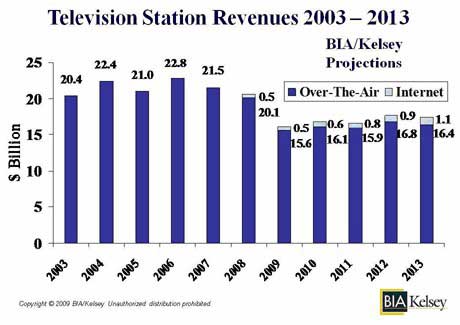For all of the talk surrounding declining newspaper subscriptions/ad revenues, there are signs that TV is heading the same direction. As you can see below, many people are switching from TV to the Internet for content delivery (in this case, news): Quite simply, TV networks will continue to lost relevancy for the same reasons newspapers have fallen behind. As shown below, TV station revenues will likely never recover from their highs in the early-to-mid 2000s:
Quite simply, TV networks will continue to lost relevancy for the same reasons newspapers have fallen behind. As shown below, TV station revenues will likely never recover from their highs in the early-to-mid 2000s:
TV networks have made some smart, defensive moves to capitalize on the trend away from TV and toward the Internet. Hulu--a joint venture between Fox, ABC, and NBC--is perhaps the best example of TV networks protecting their ad revenue streams. But it remains to be seen how they will counter threats from competitors as diverse as Netflix, YouTube, Amazon, and iTunes. Could it mean the eventual end of TV as we know it? Is this already happening? Or has it already happened?
 Quite simply, TV networks will continue to lost relevancy for the same reasons newspapers have fallen behind. As shown below, TV station revenues will likely never recover from their highs in the early-to-mid 2000s:
Quite simply, TV networks will continue to lost relevancy for the same reasons newspapers have fallen behind. As shown below, TV station revenues will likely never recover from their highs in the early-to-mid 2000s: TV networks have made some smart, defensive moves to capitalize on the trend away from TV and toward the Internet. Hulu--a joint venture between Fox, ABC, and NBC--is perhaps the best example of TV networks protecting their ad revenue streams. But it remains to be seen how they will counter threats from competitors as diverse as Netflix, YouTube, Amazon, and iTunes. Could it mean the eventual end of TV as we know it? Is this already happening? Or has it already happened?
TV networks have made some smart, defensive moves to capitalize on the trend away from TV and toward the Internet. Hulu--a joint venture between Fox, ABC, and NBC--is perhaps the best example of TV networks protecting their ad revenue streams. But it remains to be seen how they will counter threats from competitors as diverse as Netflix, YouTube, Amazon, and iTunes. Could it mean the eventual end of TV as we know it? Is this already happening? Or has it already happened?
As Stacy mentioned in class, I think the real people who should be concerned are the cable companies. The TV networks become the editors for visual content, like the NYTimes is for raw AP content. But the cable companies become "dumb pipes" (Venkat). At least in the near term, I think the TV networks will continue to have a stronghold in the media world through their partnerships with businesses like Hulu.
ReplyDeleteHowever, I think the networks value proposition will become less and less valuable. Looking to the music publishing business though, where some bands and individuals now deliver content directly to consumers... And the "editors" are no longer as valuable, and are cut from the music supply chain. TV networks can similarly be cut out. As personal video capabilities continue to near production quality, their value proposition will continue to lose steam.
the networks have to figure out other ways to increase their value proposition. Movie theatres have raised prices, tried to tailor an experience and introduced innovations like 3D movies to stay ahead of what an average consumer can access in home. TV will follow suit. It's a race, to continue to offer something a little more valuable than the consumer can get for themselves without the networks.